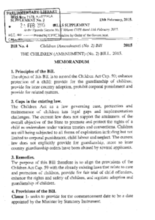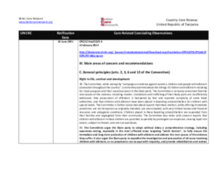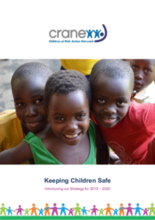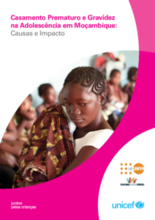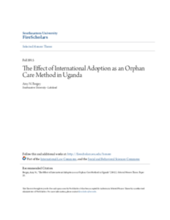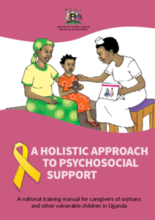Displaying 1161 - 1170 of 1617
In 2015, the Parliament of the Republic of Uganda considered the Children Amendment Bill, which has several implications for children’s care in the country. The object of the bill is to amend the Children Act Cap. 59, enhance protection of a child, provide for the guardianship of children, provide for inter country adoption, prohibit corporal punishment, and provide for related matters.
This country care review includes the care-related Concluding Observations adopted by the Committee on the Rights of the Child as part of its examination of the third to fifth combined periodic reports of Tanzania (CRC/C/TZA/3-5).
This study sought to understand gender differences in potentially traumatic events (PTEs) in orphaned and separated children in 5 low- and middle-income countries (LMIC): Cambodia, Ethiopia, India, Kenya and Tanzania.
Since its adoption in 1989, 193 countries have ratified the UN Convention on the Rights of the Child and Somalia has just become the 194th.
Having signed the Convention on the Rights of the Child in 2002, the Somali Parliament has now voted to ratify the Convention and President Hassan Sheikh Mohamud has signed it.
This video features Boniface Mwangi, a Kenyan photojournalist and activist, as he speaks with students and volunteers in the United States about international volunteering.
As a network, we aim to achieve more by working together for children than by working in isolation.
For the first years of CRANE’s life, the network strove to be the strongest and most effective Christian
network and to see Christians working together in strategic partnerships towards transformational
change for children. By the 10th anniversary, the network had established that platform. Therefore we
are now looking to make our unique contribution much clearer and much more challenging.
Este trabalho teve por objectivo analisar e compreender a magnitude, tendências, determinantes e impactos do casamento prematuro e da gravidez precoce, com o propósito de obter informações para a concepção de uma política nacional.
This literature review addresses how international adoption affects Uganda’s orphan care methods from both micro and macro perspectives.
The focus of this manual is on translating theoretical knowledge about policies into practical actions to provide psychosocial support to orphans and vulnerable children.

